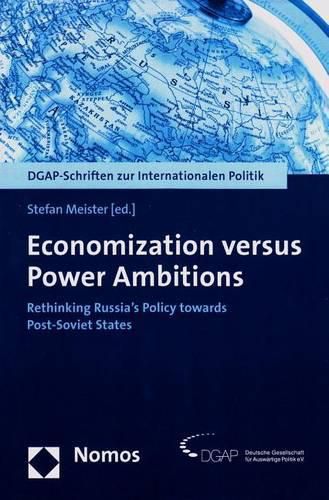Readings Newsletter
Become a Readings Member to make your shopping experience even easier.
Sign in or sign up for free!
You’re not far away from qualifying for FREE standard shipping within Australia
You’ve qualified for FREE standard shipping within Australia
The cart is loading…






Russia’s policy towards post-Soviet states oscillates between the poles of traditional power politics and the economic interests of its elites. This pattern mirrors the differences between its rather closed political system and its partly open economy. The country’s relations with its post-Soviet neighbors have three main functions: international recognition of its status as a regional power; domestic legitimization of the Putin system; and access to and distribution of income for Russian elites. Since the fall of the Soviet Union, Russia has failed to integrate post-Soviet states because it has wished to dominate them rather than taking a genuine approach to integration. The Eurasian Economic Union, which tries to imitate the European Union’s successful integration policy, will fail unless Russian leadership can develop an attractive political and economic model. As long as Russian elites are primarily interested in their own welfare, Russia will not be able to develop soft power. The EU has meanwhile managed to develop soft power and an attractive integration model, but it is not willing to make a serious commitment to becoming the normative hegemon in the post-Soviet neighborhood.
$9.00 standard shipping within Australia
FREE standard shipping within Australia for orders over $100.00
Express & International shipping calculated at checkout
Russia’s policy towards post-Soviet states oscillates between the poles of traditional power politics and the economic interests of its elites. This pattern mirrors the differences between its rather closed political system and its partly open economy. The country’s relations with its post-Soviet neighbors have three main functions: international recognition of its status as a regional power; domestic legitimization of the Putin system; and access to and distribution of income for Russian elites. Since the fall of the Soviet Union, Russia has failed to integrate post-Soviet states because it has wished to dominate them rather than taking a genuine approach to integration. The Eurasian Economic Union, which tries to imitate the European Union’s successful integration policy, will fail unless Russian leadership can develop an attractive political and economic model. As long as Russian elites are primarily interested in their own welfare, Russia will not be able to develop soft power. The EU has meanwhile managed to develop soft power and an attractive integration model, but it is not willing to make a serious commitment to becoming the normative hegemon in the post-Soviet neighborhood.